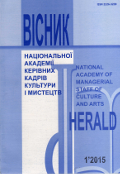TRADITIONAL CULTURE OF THE XXI CENTURY IN THE CONTEXT OF VIABILITY OF THE INTANGIBLE CULTURAL HERITAGE IN UKRAINE (ON THE EXAMPLE OF FOLKLORE)
DOI:
https://doi.org/10.32461/2226-3209.1.2015.138330Keywords:
traditional culture, intangible cultural heritage, sustainability, folklore, UNESCO, ConventionAbstract
This article provides a scientific analysis of the viability of the intangible cultural heritage in Ukraine as a component of traditional culture that promotes moral and aesthetic self-recovery of nation, preservation and development of customs, traditions, Ukrainian language, the revival of national consciousness, spirituality of people, the image of Ukraine in the European cultural space, and is the basis of the professional art development. On the example of folklore, the importance of "living culture" for humanity in the twentieth century is emphasized. The researches made by Dmitrenko M., L. Ivannikova, I. Kimakovych, I. Koval-Fuchylo, L. Kozar, A. Shalak, T. Shevchuk focus on topical issues of folklore study, the specific operation of traditional Ukrainian intangible culture, in particular the detection in the traditional culture of those phenomena that can adequately represent the global Ukrainian cultural and artistic integration process. However, the existing problems of the traditional culture of the XXI century in the context of sustainability of IKH in Ukraine as an example of folklore require more thorough study.
It is noted that Ukraine is a multiethnic state, which has a huge variety of cultural traditions and ethnic and cultural features. The viability of the intangible cultural heritage of Ukraine reflects the traditions, rituals, customs, etc. for the operation of culture. The attention is focused on the ritual transmitted orally from generation to generation and which retains in modern edge all original elements and functions: socialization, communication, emotional, aesthetic, consuming – and is a prime example of respect for the festive and ritual tradition.
Attention is focused also on traditional folk culture that is intertwined with folklore and is the root foundation of centuries-old culture of the peoples of Ukraine, retains its vitality, a system of spiritual values of the people directed to form patriotic education, comprehensive development of a nationally oriented person.
It is noted adding to the Representative List of the Intangible Cultural Heritage of Humanity by UNESCO the element of Intangible Cultural Heritage of Ukraine – "Petrikivsky painting".
The prospects of other elements of the cultural heritage of Ukraine that claim to international recognition were outlined.
It is concluded that the traditional culture of the XXI century in the context of the viability of the intangible cultural heritage in Ukraine on the example of folklore as its spiritual component is a deep foundation of all variety of types, shapes, orientations of nation-type culture and reflects people's identity, based on the continuity of cultural traditions and preserves the most important elements of the spiritual side and historical experience of peoples. Developing for many centuries, cultural traditions function naturaly and perfectly in adaption the national culture to the society and a human to national statehood.
Without knowledge of the depths of the indigenous culture and its values, one can not protect her. Intangible cultural heritage of the XXI century is in need of preservation, promotion on local and European levels.
Downloads
Published
Issue
Section
License
Authors who publish with this journal agree to the following terms:
1. Authors retain copyright and grant the journal right of first publication with the work simultaneously licensed under a Creative Commons Attribution License International CC-BY that allows others to share the work with an acknowledgement of the work's authorship and initial publication in this journal.
2. Authors are able to enter into separate, additional contractual arrangements for the non-exclusive distribution of the journal's published version of the work (e.g., post it to an institutional repository or publish it in a book), with an acknowledgement of its initial publication in this journal.
3. Authors are permitted and encouraged to post their work online (e.g., in institutional repositories or on their website) prior to and during the submission process, as it can lead to productive exchanges, as well as earlier and greater citation of published work (See The Effect of Open Access).


